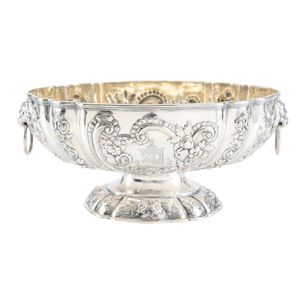William IV Sterling Silver Rose Bowl by Paul Storr
A William IV sterling silver rose bowl, by Paul Storr, London, circa 1831, the lobed boat-shaped body with floral repousse panels, centred by an engraved coat of arms, flanked by loop handles and lion masks, raised on a serpentine oval foot. Approximately 1,042 gms total weight of silver, 13.5 cm high, 28.5 cm wide, 20.5 cm depth. Provenance: Leonard Joel, the Dame Mabel Brookes collection, elm tree house, south Yarra, November 10 1971. Other Notes: originally forming part of a set of four bowls, the set was brought out from England between 1880-1890 by Dame Mabel Brookes parents. Three of the set were gifted to Dame Mabel Brooke's granddaughter Marion Davidson, and the fourth was gifted to her brother Norman Gengoult Smith, who sold his bowl in the Mabel Brookes collection handled by Leonard Joel in 1976. The remaining three bowls were sold by Mossgreen in the collection of the late Rodney Davidson AO, OBE, LLB, March 21 2017, lot 6.
You must be a subscriber, and be logged in to view price and dealer details.
Subscribe Now to view actual auction price for this item
When you subscribe, you have the option of setting the currency in which to display prices to $Au, $US, $NZ or Stg.
This item has been sold, and the description, image and price are for reference purposes only.
- Sterling Silver - Sterling silver is a mixture of 92.5% pure silver and 7.5% of another metal, usually copper. Fine silver is 99.9% pure silver, and is relatively soft and the addition of the very small amount of copper gives the metal enough strength and hardness to be worked into jewellery, decorative and household objects.
- Embossed / Repousse - Embossing, also known as repousse, is the technique of decorating metal with raised designs, by pressing or beating out the design from the reverse side of the object.It is the opposite of chasing, where the decoration is applied from the front. An embossed or repoussed object may have chasing applied to finish off the design.
- William Iv - William IV was King of the United Kingdom and King of Hanover from 26 June 1830 until his death in 1837, and in English furniture design it represented the brief period between the end of the Regency period, and the beginning of the Victorian period.
- Engraving - The method of decorating or creating inscriptions on silver and other metal objects by marking the surface with a sharp instrument such as a diamond point or rotating cutting wheel.
- Circa - A Latin term meaning 'about', often used in the antique trade to give an approximate date for the piece, usually considered to be five years on either side of the circa year. Thus, circa 1900 means the piece was made about 1900, probably between 1895 and 1905. The expression is sometimes abbreviated to c.1900.
This item has been included into following indexes:
- bowls and dishes, silver
- rose bowl - silver items 92
- Storr, Paul (England) - silver, maker or retailer 78
